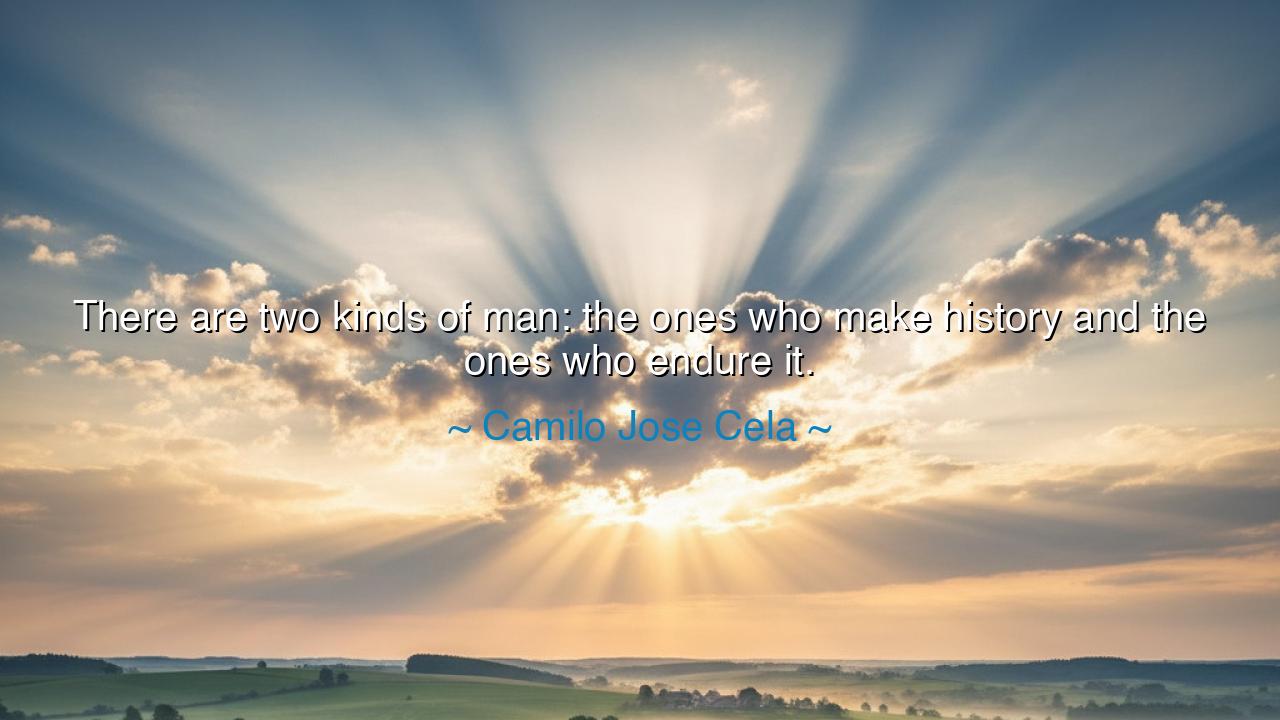
There are two kinds of man: the ones who make history and the






“There are two kinds of man: the ones who make history and the ones who endure it.” – Camilo José Cela
In these solemn and piercing words, Camilo José Cela, the Spanish Nobel laureate and chronicler of human endurance, speaks of a truth as old as civilization itself — that history is not a neutral landscape, but a battlefield upon which two kinds of souls are found. One kind shapes the course of destiny, bending it toward their will; the other endures its storms, bearing the weight of decisions they did not make, living through tides they did not choose. Cela, having lived through the Spanish Civil War and the turmoil of his nation’s reconstruction, knew both faces of mankind: the maker of history, whose actions leave marks upon the earth, and the endurer of history, whose suffering gives it meaning.
Born into the chaos of twentieth-century Spain, Cela saw firsthand how a nation’s fate could be written not only by those who held power, but by those who survived it. His own life straddled both roles — a soldier, a writer, an observer of the human condition. When he said, “There are two kinds of man,” he was not passing judgment, but revealing the eternal division of human existence. For in every age, there are those who act and those who suffer, those who create change and those who are changed by it. Yet both, in their own way, belong to the fabric of history. One provides its motion; the other, its endurance.
The ancients, too, spoke of this division. Alexander the Great conquered empires before the age of thirty, reshaping continents with the sweep of his ambition. He was a maker of history, his footsteps echoed through centuries. But behind him marched countless soldiers — nameless men who endured his dream, who died in deserts far from home, whose stories were never told. And yet, without them, Alexander’s triumphs would have been impossible. Thus Cela’s wisdom reveals a paradox: the makers of history are few, but they stand upon the shoulders of the many who endure it. Both are bound together — the ruler and the ruled, the visionary and the victim, the writer of destiny and its reader.
But Cela’s words carry more than observation; they carry warning. For if only a few dare to shape history, the world will forever belong to them, whether for good or evil. The tyrants, the conquerors, the leaders — they will write the chronicles, while the rest will live their consequences. Yet Cela’s message, born of a lifetime amid upheaval, is not one of despair. It is a call for awareness — to remind every soul that history is not an abstract force, but the sum of human choices. To endure passively is to surrender one’s share in the shaping of the world; to act, however small the act, is to claim one’s place among the makers of history.
Consider the story of Rosa Parks, a quiet seamstress in the segregated South. She was no general, no politician, no wielder of wealth. Yet when she refused to give up her seat on that Montgomery bus, she became one who made history. Her single act of defiance sparked a movement that shook the pillars of injustice. She endured the weight of history — discrimination, fear, oppression — but in the moment of courage, she transformed endurance into action. Cela’s words find their highest expression in such souls: those who suffer history’s burdens, yet through resolve and conscience, rise to alter its course.
Still, Cela does not condemn the one who simply endures. For endurance, too, is a form of greatness. The peasant who works the soil through war and famine, the mother who shields her children from the chaos of men’s ambitions, the refugee who carries hope across borders — they may not write the chronicles, but they sustain the world. History is built not only on those who act, but on those who persevere, who keep the flame alive when darkness reigns. In their patience lies the quiet heroism that outlasts the noise of conquerors.
So, my child of the future, take this teaching as both mirror and torch: ask yourself which kind of soul you will be. Will you move through life as one who endures the world, or as one who helps to shape it? There is no shame in endurance — for it is the seedbed of wisdom — but there is danger in complacency. Remember that every action, every word, every moment of courage is a thread in the vast tapestry of history. The world is not written by kings alone; it is written by all who dare to act with purpose and conscience.
And thus, as Cela reminds us, history will always be divided between those who make it and those who endure it — but the wise learn to be both: to endure with dignity, and to act with vision. Endure what you must, but never forget your power to create. For though the drums of fate may sound beyond your control, your own heartbeat — your courage, your kindness, your conviction — can still echo through time, shaping the world for generations yet unborn.






AAdministratorAdministrator
Welcome, honored guests. Please leave a comment, we will respond soon